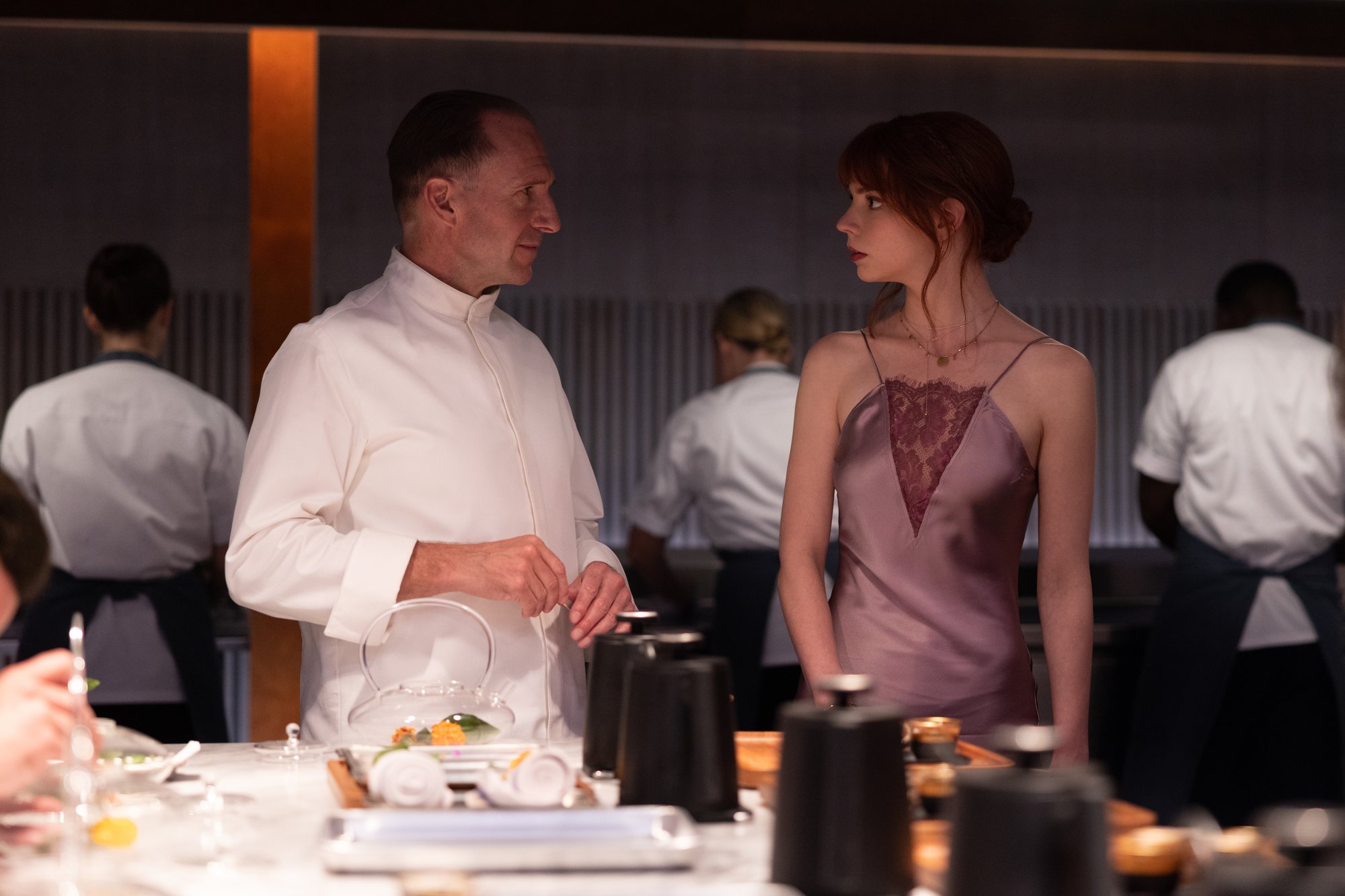Content warning: This article includes references to self-harm.
The horror comedy has become a burgeoning genre within the contemporary film industry. In the past, Hollywood execs relegated this type of film to the cheesy horror sequel—fun to watch with friends but never excelling past goofy jokes intermixed with gruesome violence. However, recently there has been an emergence of films that skillfully tell intriguing stories using both the camp aesthetics of comedy and the shock value of horror (see Ready or Not (2019) or Happy Death Day (2017)). The best and most successful horror comedies, though, are those that strike a perfect balance between their two parent genres. The Menu, released Nov. 18, 2022 and directed by Mark Mylod, is one of these. It masterfully switches between laugh-out-loud moments and disturbing imagery and, once you’ve peeled back its layers, proves to be a clever satire on food culture as well.
The film begins on an innocent, if somewhat ominous note, as we are introduced to our ensemble of characters, played by a star-studded cast. The two main protagonists, Margot and Tyler (Anya Taylor-Joy and Nicholas Hoult), wait on a pier and observe the various elites joining them for a high-class dinner that night. With the exception of Margot, each of these characters embodies a stereotype of someone who partakes in haute cuisine. Tyler represents the obsessed food enjoyer, someone who knows everything about cuisine and pays a high dollar to experience it. There’s also Lillian and Ted (Janet McTeer and Paul Adelstein), food critics with ludicrous standards and bombastic language, which they use to judge fancy restaurants. In addition, there’s a movie star and his assistant, a wealthy elderly couple, and a group of three tech bros, all of whom casually spend tons of money to carelessly experience fine dining. Among this crowd, Margot stands out as unlike the rest, and as such is the only one who doesn’t seem to be concerned about the expensive food she is consuming.
From the pier, the group travels via yacht to a remote island, home to the acclaimed restaurant of Julian Slowik (Ralph Fiennes), an innovative and world-renowned chef who is always looking to push the limits of food. At the island, we meet Elsa (Hong Chau), Slowik’s right-hand, who shows the group around the island while demonstrating how every ingredient they are eating is cultivated by hand. While at first everything seems harmless, there’s something incredibly unsettling and cult-ish about this whole environment: The way that the staff refer exclusively to Slowik as “Chef,” the fact all the staff live together on the island in a separate building while Chef sleeps alone in a cabin—it’s giving Food Network meets the Church of Scientology vibes. Alas, none of the guests bar Margot seemed concerned, likely a symptom of their snobbish and careless personalities. They all eventually make their way to the dining room, and the festivities (and horrors) begin.
The start of dinner and the emergence of Chef into the kitchen marks the beginning of the film’s main course. The comedy transitions from simple wisecracks to wholesale mocking of the food industry as Chef sends out increasingly pretentious and ironic dishes (such as a bread plate with no bread or a taco dinner with tortillas that mock the diners). As the dinner progresses, tension continues to build as Chef and his staff become more and more hostile towards the diners. First, these scenes show the genius of casting Fiennes as Chef. Most famous for playing Voldemort in the Harry Potter movies, Fiennes brings that villain’s sense of malevolence to bear as Chef. While at first his personality might seem characteristic of a savant’s eccentricity, in reality, he is far more disturbed and dangerous than he appears. Fiennes shows just enough madness to clue in the audience, but not the diners. Second, these scenes demonstrate an excellent understanding of comedic timing on Mylod’s part—the jokes are succinct enough to not deflate the suspension of the scene, leaving the audience to chuckle briefly while they wait for shit to hit the fan.
And hit the fan it does, when Chef publicly humiliates one of the sous chefs before forcing him to kill himself, then cooly sends out the next dish. This is the turning point of the film, where it becomes apparent to the guests that Chef intends for no one to leave his restaurant alive, himself and his staff included. As the guests frantically attempt to escape to no avail, Chef continues to send out course after course, unfazed by the madness of his actions. One of the best directorial decisions that Mylod makes is to interpolate shots of these meals into the scenes—the juxtaposition of the terrified diners with close-up footage of tasty food creates a delicious sense of irony. It is horrifying to watch a man commit suicide, but then equally hilarious to follow that up with pictures of the meal inspired by his death as if this is some episode of Chopped.
At this point as well, Chef reveals his hand as to why he is condemning all these guests to death. Chef sees himself as a “giver,” someone whose life revolves around providing enjoyment to others through food. On the other hand, he sees his patrons as “takers,” people who selfishly consume and enjoy without truly appreciating what they have. For Chef, these guests particularly represent the most selfish and egotistical that the food world has to offer. Tyler acts self-righteous about his knowledge of cuisine yet has no cooking ability himself. The food critics wield their reputation as a weapon against restaurants, condemning some to die for failing their excessive standards. The rest of the group represent the elites who eat at high-class restaurants not to experience the food but to show off their extravagant wealth. The irony here is that none of these “takers” actually look at food as something needed to live, and for that, Chef has judged them all as unworthy to do so.
Margot, however, is the exception. Hints are strewn throughout the first act that Margot was not supposed to be coming to this dinner, and Chef picks up on this right away, becoming particularly aggressive toward her. Halfway through the movie, Chef uncharacteristically confronts Margot privately and makes her admit that she is an escort that Tyler hired to accompany him to the dinner. To Chef, this makes a world of difference, because he also sees Margot as a “giver” rather than a “taker.” The rest of the film consists of Margot’s struggle to make it through the rest of this hellish multicourse meal alive, evading the antics of the deranged Chef and his minions. Thrills and chills run through the theater as Margot inches closer and closer to the wrong end of Chef’s knife with every scene. By the end of the film, audiences will certainly be satisfied with what comes of Margot, Chef, and the diners, even if the ending may be a little cheesy (pun-intended) for my taste.
Aside from just the directorial excellence, the film offers some amazing performances from the actors. In addition to Fiennes, some other stand-outs include Anya Taylor-Joy as Margot and Hong Chau as Elsa. Taylor-Joy has rocketed into Hollywood as a phenomenal actress, and this film is no exception. Her character’s down-to-earth personality, authentic facial reactions, and intolerance for bullshit make it exceptionally easy to root for her, especially amongst the rest of the quite irritating diners. The surprise performance, though, was Chau as Elsa, who, despite being an antagonist, serves up some great one-liners and poise. You can always see Elsa silently staring down and judging every shallow customer, always ready with a brutal put-down. She had me rooting for her from the start, despite her admittedly sinister intentions.
If there’s one word to describe The Menu, it’s unhinged. Shocking moments of terror punctuate and complement the unnerving sense of dread that the restaurateur/cult-leader Chef creates. The jokes are sharp, biting, and incredibly out-of-pocket, yet never stoop to raunchy or offensive lows to get the point across. Combined with some outstanding work by the actors and satisfying cinematography, these ingredients produce an instant horror-comedy classic that is sure to linger on the tastebuds for years to come. Don’t skip up the opportunity to sample this flavorful movie.




